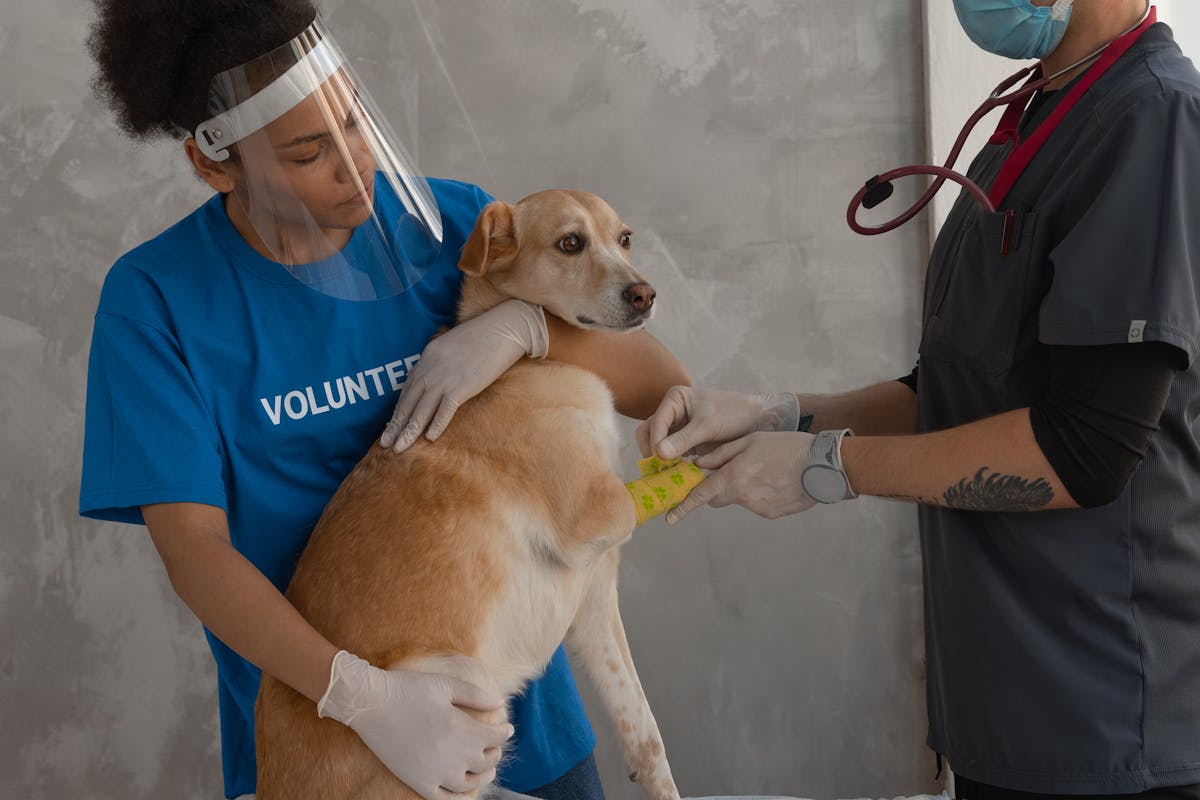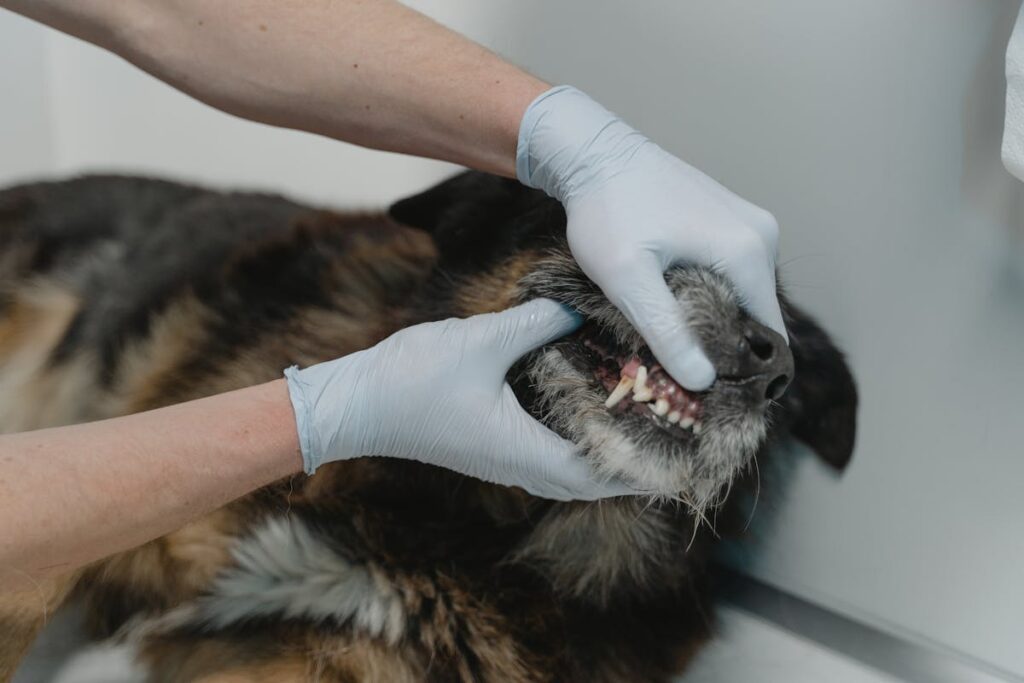Understanding the Basics of Pet Dental Health
Understanding the basics of pet dental health is vital for ensuring the overall well-being of pets, as oral health is intricately linked to their systemic health. Dental anatomy varies among species, necessitating a thorough understanding of each pet’s unique oral structure. This knowledge aids in identifying potential issues and implementing appropriate preventive measures. Oral hygiene is a significant component in maintaining dental health, requiring regular cleaning to prevent plaque accumulation and subsequent periodontal disease. Effective oral hygiene practices, such as brushing and the use of veterinary-recommended products, contribute to the prevention of oral maladies. Veterinarians emphasize that routine dental assessments are essential for monitoring dental anatomy changes and ensuring peak oral health, ultimately safeguarding the pet’s overall health and quality of life.
Common Dental Problems in Dogs and Cats
Dental ailments are prevalent concerns in canine and feline populations, greatly impacting their quality of life if left untreated. Common dental problems include tooth decay and gum disease, both fueled by plaque formation and tartar buildup. These conditions often lead to bad breath and, if neglected, may progress to severe oral infections. The presence of dental abscesses can cause significant discomfort, potentially resulting in tooth loss. In cats, resorptive lesions are frequent, while dogs often suffer from periodontal disease. These issues not only cause pain but also hinder eating and overall well-being. Regular veterinary check-ups and effective oral hygiene practices are essential to prevent these conditions, ensuring that pets maintain ideal dental health and a higher quality of life.
How Dental Issues Affect Your Pet’s Overall Health
The impact of dental issues extends beyond mere discomfort, influencing the overall health of pets in significant ways. Dental bacteria proliferating in the oral cavity can breach the gum line, entering the bloodstream and potentially leading to systemic infections. This bacteremia can affect essential organs, including the heart, liver, and kidneys, triggering conditions such as endocarditis or nephritis. The systemic burden of untreated dental disease can compromise immune function, exacerbating chronic health issues. Furthermore, persistent pain from oral disease can alter a pet’s eating habits, leading to nutritional deficiencies and weight management problems. Recognizing these interconnected health risks underscores the necessity for vigilant dental care as a critical aspect of pet wellness, protecting them from far-reaching medical complications.
The Importance of Regular Veterinary Dental Check-Ups
Regular veterinary dental check-ups are essential in preventing dental diseases, which are prevalent among pets and often lead to more severe health complications if left untreated. Through these examinations, veterinarians can identify early signs of dental issues, facilitating timely interventions that can greatly enhance a pet’s quality of life. In many cases, scheduling a pet dental cleaning in Reno is a simple yet effective step toward ensuring long-term oral health. With a compassionate approach, veterinary professionals play an important role in maintaining the overall well-being of pets by ensuring their dental health is meticulously monitored and managed.
Preventing Dental Diseases
Ensuring ideal oral health in pets necessitates proactive measures to prevent dental diseases, with regular veterinary dental check-ups playing an essential role. These check-ups facilitate the implementation of preventive measures vital for maintaining optimal dental hygiene. Regular assessments by veterinary professionals identify potential risk factors for dental pathologies, such as plaque accumulation and gingivitis, before they escalate. By adhering to a thorough oral care regimen, including professional cleanings and at-home maintenance, pets can benefit from improved dental health and overall well-being. Veterinary expertise provides a tailored approach to each pet’s unique dental needs, fostering long-term oral health. The compassionate monitoring of a pet’s oral cavity through routine check-ups is indispensable in mitigating the onset of dental diseases, enhancing their quality of life.
Early Detection Benefits
Routine veterinary dental check-ups serve as a pivotal mechanism for the early detection of dental issues, offering numerous benefits that extend beyond basic oral care. By identifying potential problems at an initial stage, veterinarians can implement preventive measures to avert the progression of oral diseases. This proactive approach greatly enhances the overall oral health of pets, reducing the risk of pain, infection, and systemic complications. Early detection not only aids in maintaining healthy teeth and gums but also contributes to the longevity and well-being of pets. Veterinary professionals, utilizing advanced diagnostic tools and expertise, can uncover hidden issues such as periodontal disease or tooth resorption, ensuring timely intervention. Consequently, regular dental evaluations are indispensable for sustaining ideal pet health.
Effective Home Dental Care Practices for Pets
Although often overlooked, the implementation of effective home dental care practices for pets is essential for maintaining their overall health and well-being. Key components include selecting suitable toothbrush types and employing correct brushing techniques to optimize plaque control and promote gum health. Dental treats and toys can serve as adjuncts, assisting in the mechanical removal of debris while also providing stimulation. Incorporating oral rinses into a pet’s routine can further enhance oral hygiene by reducing bacterial load. Establishing a regular cleaning schedule is imperative to prevent periodontal disease, a prevalent concern in canine and feline populations. By integrating these practices, pet owners can greatly contribute to the longevity and quality of their companions’ lives in a compassionate and scientifically informed manner.
Choosing the Right Dental Products for Your Pet
A multitude of dental products are available to pet owners seeking to enhance their pets’ oral health, each designed to address specific needs and conditions. Selecting the ideal product requires careful consideration of product features and individual pet requirements. Natural dental options, such as enzymatic toothpaste and dental chews, provide effective plaque control while minimizing exposure to synthetic substances. Additionally, products containing chlorhexidine or zinc gluconate offer antimicrobial benefits, essential for reducing oral bacterial load. Owners must assess their pets’ willingness to accept different textures and flavors, ensuring compliance. Consulting veterinary professionals can guide choices tailored to pets’ specific dental needs, fostering a thorough oral hygiene regimen. Ultimately, the right selection promotes longevity and quality of life for furry companions.
Recognizing Signs of Oral Health Issues in Pets
How can pet owners identify early signs of oral health issues that might otherwise go unnoticed until they escalate into more serious conditions? Vigilant observation of a pet’s behavioral and physical changes is essential. Unusual drooling may indicate underlying dental problems such as periodontal disease or oral lesions. Additionally, persistent bad breath, medically termed halitosis, often signals bacterial accumulation and potential infection. Behavioral signs such as difficulty eating, pawing at the mouth, or decreased interest in food can also suggest oral discomfort. Clinicians emphasize the importance of regular oral examinations and dental cleanings to prevent progression of these symptoms. Early detection and intervention are critical in maintaining peak oral health, enhancing overall well-being, and preventing systemic health complications in pets.

The Role of Diet in Maintaining Pet Dental Health
A pet’s diet plays a critical role in maintaining ideal dental health, with nutritional composition directly impacting the integrity of teeth and gums. A balanced diet, rich in essential nutrients, can strengthen oral structures and mitigate the risk of periodontal disease. Conversely, the avoidance of harmful foods, particularly those high in sugars and acids, is crucial to prevent dental decay and promote a healthy oral environment.
Nutritional Impact on Teeth
While often overlooked, diet plays a vital role in maintaining pet dental health through its direct impact on oral hygiene. A balanced intake of essential nutrients facilitates ideal nutrient absorption, thereby promoting the maintenance of strong, healthy teeth in dogs and cats. Specifically, certain nutrients such as calcium and phosphorus are essential in preserving dental integrity. Additionally, the texture of a pet’s diet influences mechanical cleaning of teeth, aiding in plaque removal and promoting effective dental hygiene. Conversely, a diet high in sugars or lacking essential nutrients can exacerbate oral health issues, leading to tartar buildup and periodontal disease. Accordingly, a scientifically-formulated diet not only supports overall health but also serves as a fundamental component in safeguarding a pet’s dental well-being.
Balanced Diet Benefits
The foundation of pet dental health is intricately linked to the influence of a balanced diet. A diet rich in essential nutrients supports ideal nutrient absorption, directly impacting oral health. Nutrients such as calcium and phosphorus are essential for the development and maintenance of strong teeth and bones, while vitamins and antioxidants enhance gum health and tissue repair. A balanced diet also plays an important role in maintaining a healthy dental microbiome, the community of microorganisms residing in the oral cavity. This microbiome helps protect against pathogenic bacteria that contribute to dental diseases. By ensuring pets receive a variety of nutrients, a balanced diet supports not only systemic health but also the preservation of dental integrity and hygiene.
Avoiding Harmful Foods
Despite the significance of a balanced diet, it is equally essential to avoid harmful foods that can negatively impact pet dental health. Certain harmful snacks, such as sugary treats or acidic foods, contribute to plaque buildup and subsequent periodontal disease. Scientific studies have shown that these foods facilitate the proliferation of oral bacteria, which thrive in environments rich in sugar and acid. Additionally, bones or excessively hard chews may cause tooth fractures or injuries to the gums.
Conversely, specialized dental treats can promote oral health by mechanically reducing plaque accumulation through chewing action. These products are formulated to support dental hygiene and are often enriched with enzymes that inhibit bacterial growth. Therefore, selecting appropriate snacks and dental treats is vital in maintaining ideal dental health in pets.
Professional Dental Cleaning: What to Expect and How Often
A vital component of maintaining a pet’s oral health is professional dental cleaning, which plays an essential role in preventing periodontal disease and other oral conditions. During a professional dental cleaning, pets undergo anesthesia procedures to guarantee a thorough and stress-free experience. This allows veterinarians to effectively remove tartar and plaque from beneath the gumline, where harmful bacteria reside. The frequency of dental cleanings should be tailored to an individual pet’s needs, typically ranging from annually to biannually, based on their oral health status. Following the procedure, veterinarians provide detailed post care instructions to guide pet owners in supporting recovery and maintaining oral hygiene. Adhering to these guidelines is vital for minimizing complications and promoting long-term dental health in pets.
Frequently Asked Questions
What Are the Costs Associated With Professional Pet Dental Cleaning?
Professional pet dental cleaning costs vary due to factors such as geographic location, clinic reputation, and pet size. Pricing variations also depend on anesthesia use, necessary extractions, and additional services. Consultation can provide precise estimates and detailed explanations.
Can Dental Cleaning Prevent Bad Breath in Pets?
Dental cleaning can greatly reduce bad breath in pets by addressing plaque and tartar buildup. Regular professional cleanings enhance dental hygiene, mitigating odor-causing bacteria and contributing to overall oral health, improving pets’ quality of life.
Are There Any Risks Involved With Pet Dental Anesthesia?
The current question addresses dental anesthesia risks in pets, highlighting potential complications. Pet anesthesia safety involves evaluating individual health, ensuring proper monitoring, and using advanced techniques to minimize adverse effects, thereby prioritizing the animal’s well-being with a compassionate approach.
How Can I Make Dental Cleaning Less Stressful for My Pet?
To reduce stress during dental cleaning, pet owners can employ positive reinforcement techniques and introduce dental toys. Gradual acclimatization, combined with rewards, can create a more relaxed experience, enhancing both psychological comfort and oral health outcomes.
What Are the Signs of a Successful Dental Cleaning in Pets?
Signs of successful dental cleaning in pets include improved oral hygiene, fresh breath, and absence of tartar. Dental care effectiveness is evident through reduced gum inflammation, healthier teeth, and a happier demeanor indicating overall comfort and well-being.
